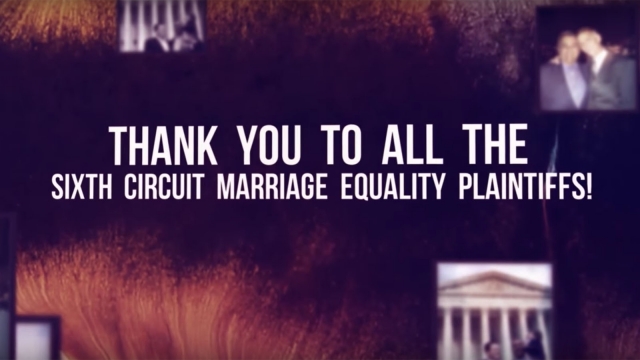The Brave Plaintiffs Who Helped Pave the Way for Nationwide Marriage Equality

Prior to the Supreme Court’s decision in favor of nationwide marriage equality, brave couples from all 50 states stood up and fought back against regressive laws through the courts and state legislatures to expand equal rights for all. They lived openly and honestly, shared their stories of struggle and love with the nation, and moved hearts and minds like never before.
Dozens of courageous couples took their fight for marriage equality to court, including Jim Obergefell, the named plaintiff in the 2015 Supreme Court case that brought nationwide marriage equality.
In January 2015, the Supreme Court announced that it would hear Obergefell v. Hodges, a consolidation of Jim’s case with the cases of other plaintiffs from Kentucky, Ohio, Michigan and Tennessee. David Michener & William Herbert Ives, Robert Grunn, Nicole Yorksmith & Pamela Yorksmith, Joseph J. Vitale & Robert Talmas, Brittani Henry & Brittni Rogers, Kelly Noe & Kelly McCraken, Gregory Bourke & Michael DeLeon, Randell Johnson & Paul Campion, Jimmy Meade & Luther Barlowe, Kimberly Franklin & Tamera Boyd, Maurice Blanchard & Dominique James, Timothy Love & Lawrence Ysunza, Joy “Johno” Espejo & Matthew Mansell, Kellie Miller & Vanessa DeVillez, Sergeant Ijpe DeKoe & Thomas Kostura, Valeria Tanco & Sophia Jesty and April DeBoer & Jayne Rowse, were just some of the brave individuals and couples that fought for marriage equality in those states over the past several years.
Only a few short months later, the Supreme Court heard oral arguments in Obergefell v. Hodges on April 28, 2015, and ruled in favor of marriage equality on June 26, 2015.
One year later we honor the brave plaintiffs who helped pave the way for nationwide marriage equality – an important milestone in the fight for full LGBTQ equality. But there is more work ahead. Currently, 32 states lack fully-inclusive non-discrimination protections for LGBT people in housing, employment,and public accommodations, meaning that despite the Supreme Court ruling making marriage equality the law of the land. LGBT Americans can now marry in every state, but remain at real risk for discrimination. No one should be fired, denied an apartment, or refused service because of who they are. Last year on the heels of the Supreme Court’s decision, Congress introduced a solution: the Equality Act. The Equality Act would guarantee protections from discrimination on the basis of sexual orientation and gender identity virtually every area of LGBTQ people’s lives from the school room to the court room to the board room. Learn more about the Equality Act.
Watch now:
You Might Like
